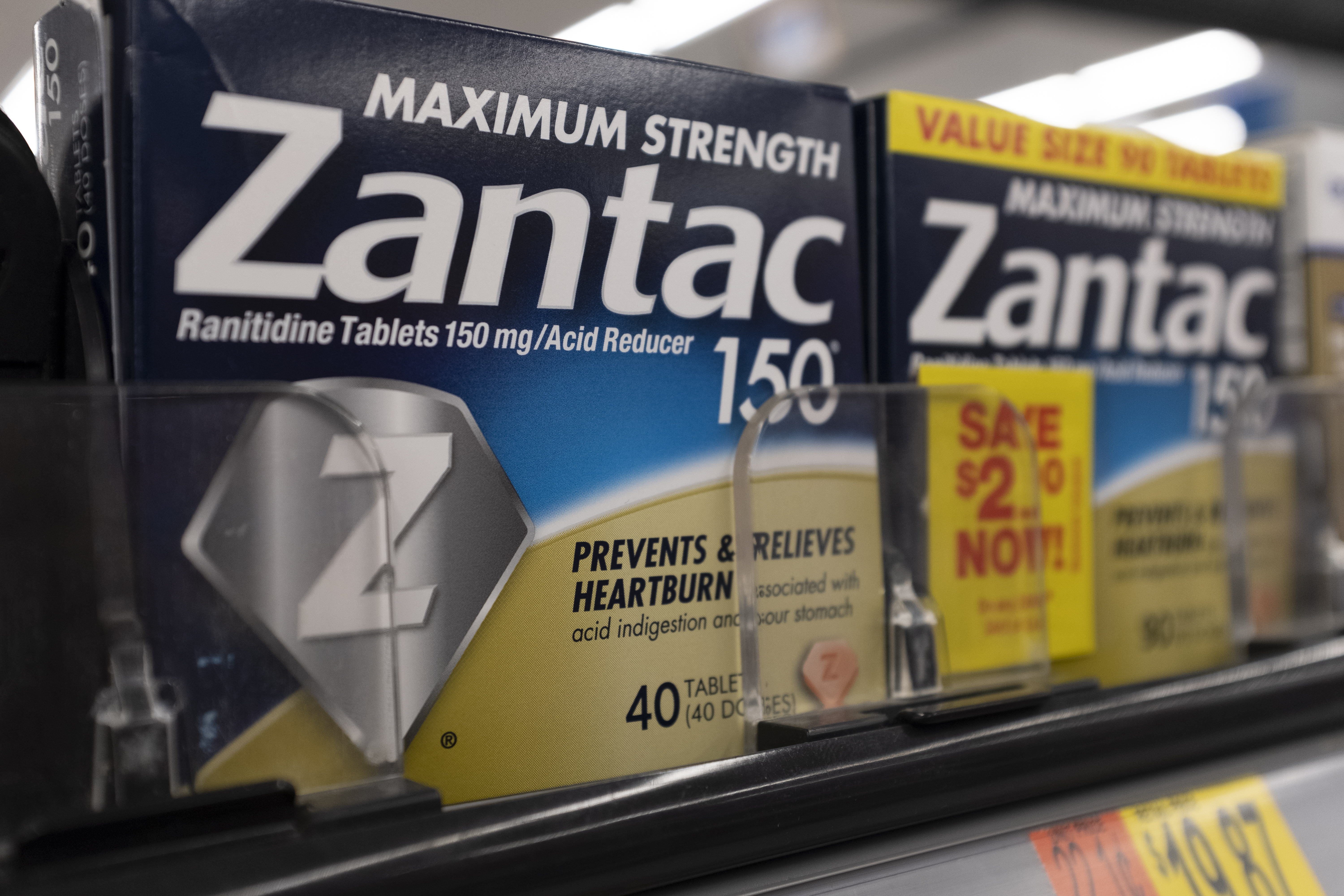Sanofi to settle about 4,000 suits over Zantac cancer claims

Zantac heartburn medicine are seen at a store in Mountain View, California, in October 2019. (Photo by Yichuan Cao/Sipa USA/Sipa via AP Images)
Sanofi SA said it has agreed to settle approximately 4,000 lawsuits accusing the French drugmaker of selling its Zantac heartburn medicine without warning patients that it could cause cancer.
The pact, the first major resolution of cases related to the product, will apply to litigation pending in courts in states other than Delaware, the company said in a statement. Earlier, people familiar with the negotiations told Bloomberg that as many as 5,000 cases could eventually be covered by the deal.
The settlement should help soothe the jangled nerves of investors concerned about the fallout of multiple legal challenges to Sanofi and others who made the medicine over the years, including its developer GSK Plc.
Sanofi shares rose as much as 1.1% in Paris trading. GSK was little changed in London.
Concerns about Sanofi’s and other drugmakers’ exposure to Zantac suits helped wipe out about $45 billion in market value from the companies’ stock in the summer of 2022. The shares have since recovered.
The settlement “affirms our view that none of these Zantac cases are likely to go to trial in the United States and the overhang will continue to be diminished for both Sanofi and GSK,” Emily Field and other analysts at Barclays wrote in a note.
Sanofi said that it continues to believe that the claims don’t have merit and that it reached the settlement to avoid the expense of litigation. GSK has made similar comments.
The French drugmaker declined to say how much it will pay out under the accord. The amount, it said, won’t have a material impact on its finances as it reflects “the limited time during which Sanofi marketed Zantac and the strong defenses available to Sanofi in these cases.”
Zantac, developed by GSK and Warner-Lambert, hit the US market as a prescription drug in 1983 before becoming an over-the-counter heartburn treatment in 1996. It was owned by several companies before Sanofi acquired it in 2017.
The deal doesn’t resolve an estimated 20,000 Zantac claims against Sanofi in Delaware, said the people, who requested anonymity because they weren’t authorized to speak publicly about the pact. A judge hasn’t yet ruled whether those cases can proceed to trial.
Zantac recall
Sanofi recalled Zantac in 2019, about a month after Valisure—an independent lab—released tests showing the likely carcinogen NDMA in the drug and its generics. The lab’s research indicated the drug’s active ingredient, ranitidine, formed NDMA over time or in elevated temperatures. The US Food and Drug Administration confirmed the findings in April 2020 and ordered drugmakers to take the medicine off the market.
Sanofi has since returned Zantac to store shelves, but without ranitidine. It’s now made with famotidine, the active ingredient in competitor Pepcid. Zantac is the third leading antacid sold in the U.S. Other companies, such as GSK and Pfizer Inc., have resolved individual Zantac cases ahead of jury trials, but haven’t backed wider settlement efforts.
The Sanofi accord focuses on state court cases. A federal judge in 2022 threw out more than 5,000 suits filed in federal court in Florida, saying the science behind the cancer claims was flawed. U.S. District Judge Robin Rosenberg’s ruling also covered about 50,000 unfiled Zantac cases gathered before her for pretrial information exchanges.
Many former Zantac users refiled their cases in state courts. Delaware officials say more than 70,000 Zantac suits have been filed against a host of defendants in the state’s Superior Court. About 20,000 of those case target Sanofi.
Judge Vivian Medinilla in Wilmington, Delaware is weighing the validity of the scientific evidence underlying those cases and is expected to rule soon on whether juries can hear the suits. None of the US Zantac cases have gone to trial.
FDA, EMA
In its 2023 annual report, Sanofi said the company faces 3,280 US suits that encompass claims from more than 26,000 former Zantac users and acknowledged “additional cases may be filed.” It added in the report that the company believes there is “no reliable scientific evidence that Zantac causes the alleged injuries.”
The FDA and the European Medicines Agency have both evaluated the available data and found no evidence that ranitidine, the active ingredient contained in Zantac, causes cancer, the report said.
Sanofi’s financial exposure to its Zantac woes was reduced last year when the French pharma company defeated Boehringer Ingelheim GmbH in an arbitration over who must pay for legal exposure over the heartburn treatment’s sales.
Boehringer—another drugmaker that owned Zantac at one time—argued Sanofi agreed to indemnify it for the costs of defending US Zantac suits as part of a 2016 deal. The International Chamber of Commerce arbitration panel rejected the German company’s indemnification claim.
Write a letter to the editor, share a story tip or update, or report an error.


